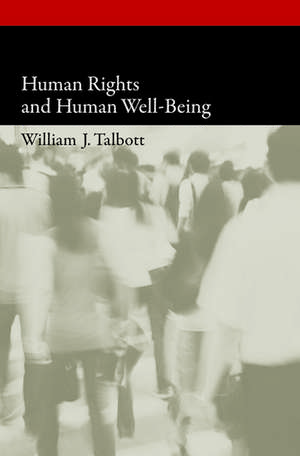Human Rights and Human Well-Being: Oxford Political Philosophy
Autor William Talbotten Limba Engleză Hardback – 9 dec 2010
Preț: 430.37 lei
Preț vechi: 555.99 lei
-23% Nou
Puncte Express: 646
Preț estimativ în valută:
82.35€ • 85.98$ • 68.16£
82.35€ • 85.98$ • 68.16£
Carte tipărită la comandă
Livrare economică 24-31 martie
Preluare comenzi: 021 569.72.76
Specificații
ISBN-13: 9780195173482
ISBN-10: 0195173481
Pagini: 432
Dimensiuni: 234 x 156 x 24 mm
Greutate: 0.77 kg
Editura: Oxford University Press
Colecția OUP USA
Seria Oxford Political Philosophy
Locul publicării:New York, United States
ISBN-10: 0195173481
Pagini: 432
Dimensiuni: 234 x 156 x 24 mm
Greutate: 0.77 kg
Editura: Oxford University Press
Colecția OUP USA
Seria Oxford Political Philosophy
Locul publicării:New York, United States
Recenzii
Talbotts Human Rights and Human Well-being is a fascinating read for anyone consequentialist or not with an interest in the theoretical arguments surrounding the origins of human rights.
Notă biografică
William J. Talbott is Professor of Philosophy at the University of Washington, where he has been teaching since 1989. He has published articles in moral and political philosophy, especially the philosophy of human rights, philosophy of law, epistemology, and rational choice theory. This is the second of two volumes on human rights. The first was Which Rights Should Be Universal? (OUP, 2005).




























